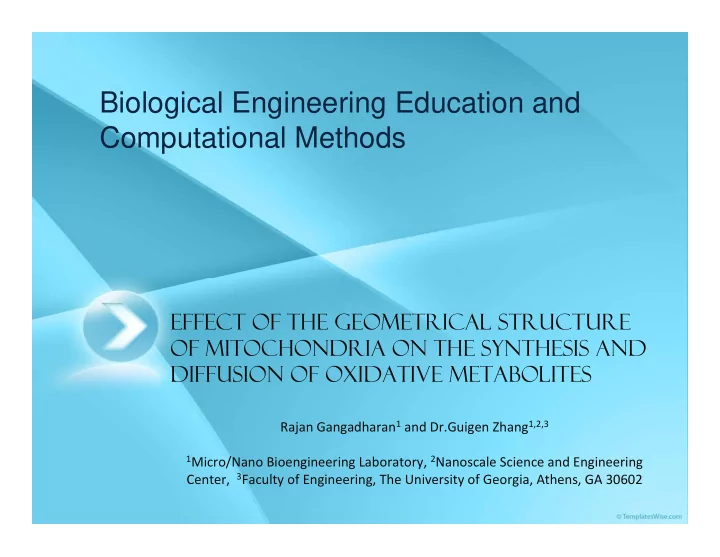

Biological Engineering Education and Computational Methods Effect of the Geometrical Structure of Mitochondria on the Synthesis and Diffusion of Oxidative Metabolites Rajan Gangadharan 1 and Dr.Guigen Zhang 1,2,3 1 Micro/Nano Bioengineering Laboratory, 2 Nanoscale Science and Engineering Center, 3 Faculty of Engineering, The University of Georgia, Athens, GA 30602
Introduction • Abundant new information on the structure and dynamics of living cells are currently available – Aided by advances in Microscopy & Molecular biology. • Computational approaches are needed to link all these new data • Issues in computational approach: Cell systems are complex – Interdependent chemical reactions and structural components regulates cell processes
Introduction • Spatiotemporal computational approaches ‐ one way to answer the complexity • Partial differential equations ‐ defines concentration changes in space and time. – ODEs can define reactions, membrane transport and electrical potential – Diffusion of molecules within complex geometry defined by using PDEs
Research background – Mitochondria cristae structure
Research Questions
Previous Work
Model Development
Model Geometry Model Development
Model Development
Model Development Example: For complex I the reaction rate is defined as
Results – Effect of the tubular junction on ADP concentration
Results – Effect on membrane potential Potential change at various points on the inner membrane and cristae Effect of diameter of tubular connection on potential 195 200 Point A 190 Point B No tubular connection Point C Tubular connection - 40nm dia Membrane Potential (mV) 190 Membrane Potential (mV) Point D 185 Tubular connection - 20 nm dia 180 180 175 170 170 165 160 160 155 150 10 -10 10 -9 10 -8 10 -7 10 -6 10 -5 10 -4 10 -3 10 -2 10 -1 10 0 10 1 10 2 10 3 10 4 10 -12 10 -11 10 -10 10 -9 10 -8 10 -7 10 -6 10 -5 10 -4 10 -3 10 -2 10 -1 10 0 10 1 10 2 10 3 10 4 10 -12 10 -11 Time (s) Time (s)
Conclusion and Further Work
I thank Dr. Guigen Zhang, My group members and Faculty of Engineering , University of Georgia for their support Thank You
Recommend
More recommend